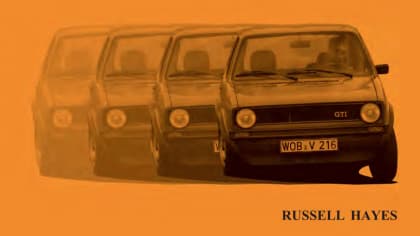THE ANATOMY OF AUTONOMY
Dinosaurs and Driverless Cars
This article is from our archives and has not been updated and integrated with our "new" site yet... Even so, it's still awesome - so keep reading!
Published on Sat, Mar 5, 2016
By: The LACar Editorial Staff

This past Monday saw me at the downtown Los Angeles Public Library for and LA Times event entitled The California Conversation. A series of moderated speakers gave presentations on the topic of transportation in Los Angeles now and in the future.
Speakers included Mayor Eric Garcetti, US Transportation Secretary Anthony Foxx, head of Google's self-driving car Google Chris Urmson, and Hyperloop CEO Rob Lloyd. The full house 200 member audience consisted of local governmental transportation professionals, civic leaders, and a few random interested parties such as myself.
All presenters were well spoken, came prepared, and made their respective cases well. What struck me most overall was that the government people spoke in terms of what they are going to do. They spoke of a 20-year plan in the works with committees being formed to study the issue. I could well imagine the entire presentation event taking place 20 years ago and 20 years hence with the same exact words spoken.
Compare this to the corporate people talking about what they are doing. Chris Urmson explained how Google is developing the self-driving car, what early technological hurdles they had to overcome, and how they are going about solving the problems. This is all very interesting from an engineering standpoint. It is also quite exciting from a societal standpoint to think that the collective 'we' are right here to witness this happening.
Did you know that each self-driving car shares its data with the next? So, if a self-driving car comes across road construction, the next one coming along the same road will be made aware and know how to maneuver around it. So much accumulated data.
With all major tech breakthroughs there must also be the dinosaurs like me who lament the loss of life as we knew it. How the new technology will improve our lives remains to be seen. Who could predict the impact of powered flight 100 years ago on today's world? The first automobiles were, in fact, seen by many as a passing fad. And electricity? What are you going to do—string a wire to every single house in the country? Until just over 100 years ago, every single word spoken, song sung, or wonderful transient sight was there for its moment and then gone.
I will admit to using a computer, cell phone, and many other modern gadgets to help move my life along. Those things make life more efficient and fun. But I refuse to believe that posting a handful of Facebook posts each day equates to actually accomplishing something. My daily driver pickup lacks windshield wipers, radio, and heater. I even have to operate the window mechanism by hand. This doesn't mean I'm a better person than the next guy. This simply translates to accepting some semblance of control in my lifestyle.
I am not part of the self-driving car generation and am glad for it. Part of why I don't want a newer car is that I prefer to not be followed around by some autonomous digital collection agency. My ego doesn't hold itself in overly high regard. Rather, I prefer to think my life is more than just another data mine. And I am perfectly willing to assume responsibility for knowing where I am going, knowing how to get there, and actually doing it myself with no one watching.
Recall a time not so long ago when big-tech was owned by high rollers and counted as symbols of attainment? Hi-fi stereo sets, color television, big cars...all very personal items that could only be shared with actual people. Today we have eight-year old kids with iPhones in their pockets and hundreds of invisible followers.
In the long term scheme, it's just things. I will be sleeping with dinosaurs all too soon anyway and it will be up to someone else.
- Harold Osmer
Harold Osmer is responding to an article by Bob Lutz, “Fully Autonomous Cars Will Kill the Auto Industry as We Know It"





